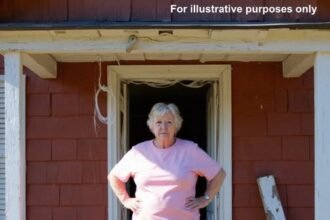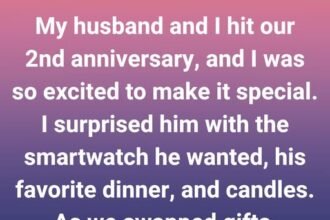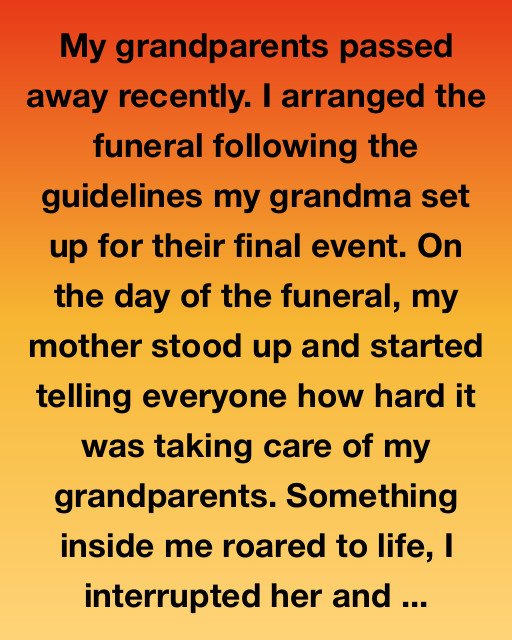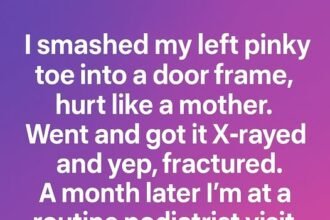You gave us more than care. You gave us dignity. You gave us peace.
You gave us company when the world felt too quiet. Don’t let bitterness win. Forgive your mother.
She doesn’t know what she missed. But you—your heart was open. Never close it.”
I cried then.
Hard. The letter continued, “There’s a key hidden in the sugar jar. Use it.”
I found the key.
Small, rusted, tied with a ribbon. I knew what it opened. The attic.
I hadn’t gone up there in years. It took a minute to gather the courage. The stairs creaked like always.
Dust floated in the beam of my phone’s flashlight. I found the old trunk in the corner. Same one Grandpa used when he came back from working in Germany in the ’80s.
Inside, I found a box marked For Ana. There were old photos, journals, and something else—papers from the bank. I read them carefully.
My hands started to shake again. They had left the house to me. Not to my mother.
Not to my uncle. Just me. I didn’t expect that.
They never mentioned it. But as I read the letter attached, I understood. “We know it’s not much.
But it’s peace. Use it how you need. And maybe—just maybe—you can make this house a home again.”
I didn’t know what to do at first.
A part of me felt guilty. Another part felt seen. They had noticed.
Everything I did, all those silent mornings and long nights, they had seen it all. The next morning, my mother called. She didn’t mention the funeral.
She just said, “So, you stayed at their place?”
“Yeah,” I replied, keeping my voice even. “I was thinking maybe I could stop by this weekend. Go through their things.
Maybe take a few keepsakes.”
“You can come by,” I said. “But I found the will. They left the house to me.”
Silence.
Then, “Oh.”
“I’m not throwing you out,” I added. “But I need you to know—this was their decision.”
I thought she might argue. But she didn’t.
She said, “Alright. I guess they trusted you.”
That was the first honest thing she’d said in a long time. She came that Saturday.
She was quiet, softer. She walked around like she didn’t recognize the place. Maybe she didn’t.
Maybe she only saw it as a burden. I helped her pack a small box—Grandma’s scarf, Grandpa’s wristwatch, an old tea tin. When she left, she hugged me.
“Thank you for letting me come.”
It wasn’t an apology. But it was something. I spent the next few weeks fixing up the house.
Not big changes—just cleaning, repainting, planting new flowers in the yard. I left the old porch swing. That was where they used to sit every evening.
I started working from home. I’d write in the mornings and tend to the garden in the afternoons. Sometimes the neighbor’s dog would wander over.
Sometimes the neighborhood kids would ask to pick apples from the tree in the back. It started to feel alive again. One day, I got a letter.
A handwritten one, from someone named Larisa. She introduced herself as my grandmother’s childhood friend. She said she’d been abroad for decades but had written Grandma every few months.
When she heard the news, she wanted to reach out. “I don’t have family anymore,” she wrote. “But your grandmother was mine.
If you ever want to meet, I’d love to share some stories.”
I met Larisa a few weeks later. She was in her seventies, sharp and kind. She brought a tin of almond cookies and a folder full of black-and-white photos.
We talked for hours. She told me how Grandma used to sing in a local band. How Grandpa once rode a bike 60 kilometers just to bring her flowers.
“They were rare,” she said. “That kind of love—most people never touch it.”
It stayed with me. A few months later, I started a little project.
I called it “Porch Stories.” I invited elders from the neighborhood to come by on Saturdays and share a story from their youth. I recorded them, added subtitles, and uploaded the clips online. At first, only a few people watched.
Then the views grew. Comments poured in—people thanking the storytellers, asking for more, saying it reminded them of their own grandparents. It felt like something beautiful was growing.
One day, a young woman named Daria messaged me. She had been following “Porch Stories” for months. Her grandmother had passed too, and the videos helped her grieve.
“My family never let her talk about her past,” she wrote. “But your project made me wish I had asked more questions. Thank you.”
We kept talking.
She was thoughtful, curious, had a gentle way with words. Eventually, she came to visit. We sat on the same porch swing, drinking tea and laughing over old photos.
Months passed. Seasons changed. The garden bloomed again.
One evening, as the sun dipped low and the porch lights flickered on, I looked around and felt something click. I had turned grief into connection. Silence into stories.
A house into a home again. And I had done it by honoring the truth. My grandparents taught me many things.
But the most important one was this: Love is not loud. It’s not always perfect. But it’s consistent.
It shows up. Even when it’s hard. I forgave my mother eventually.
We talk now. Not about the past—but about small things. I don’t expect miracles.
But I do believe people can change when they’re given space to. Looking back, I’m grateful I stood up that day. Not to hurt anyone—but to protect what was real.
Because sometimes, when the world is quiet enough, the truth whispers through the cracks. And if you’re brave enough to listen, it leads you home. If this story moved you, share it with someone you love.
Let them know it’s never too late to speak up, to forgive, or to plant something new where something old once stood. And if you’ve ever taken care of someone in silence—thank you. The world needs more hearts like yours.





